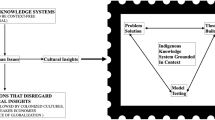Abstract
Management research and practice have largely followed the basic constructs and frameworks developed in the West during the last 150 years. Despite considerable progress that we have made in our practice of management a few fault lines remain. This includes mounting sustainability challenges and deprived meaning at work place leading to job burnout and stress experience by employees, to name a few. The other issue that merits closer attention is the assumption that management theories developed in the west are seamlessly applicable in other cultural settings such as the East. This paper emphsises the need for studying indigenous management practices and developing appropriate management theories rooted in native knowledge repositories. Indian Knowledge System can provide specific opportunties to explore new management concepts and expand our understanding of management. A few speific areas have been identified for futher study. The paper concludes by identifing potential challeneges that one will encounter when advancing research using indigenous concepts and frameworks.

Similar content being viewed by others
References
Adhia H, Nagendra HR, Mahadevan B (2010) Impact of adoption of yoga way of life on the reduction of job burnout of managers. Vikalpa 35(2):21–33
Mahadevan B (2013) Inspirational leadership: perspectives from Gītā. In: Kutumba SV (ed) Chapter 13 in sanskrit and development of world thought. D K Print World, New Delhi, pp 199–210
Mahadevan B, Bhat VR, Nagendra Pavana RN (2022) Introduction to Indian knowledge system: concepts and applications. PHI Learning, New Delhi
Mahadevan B (2015) Failed leadership: new perspectives from srimad Bhagavad Gita. Ninth Vedanta Vachaspati Justice Radhanath Pukhan Biennial Memorial Lecture, Vivekananda Institute of Culture, Guwahati
Mahadevan B (2023) Yajña as a framework for addressing sustainability: perspectives from Bhagavad Gītā. International conference on sustainability: an ancient Indian approach, Management Center for Human Values at IIM Calcutta, 11–12 August, 2023 (Accepted for presentation)
Marques J (2011) Spirituality, meaning, interbeing, leadership, and empathy: SMILE. Interbeing 4(2):7–17
Mahadevan, B. (1999) The New Manufacturing Architecture. pp. 107 - 113. Tata McGraw-Hill Publishing Company Limited, New Delhi.
Funding
We further state that we have not received any funding to conduct the research reported in this paper.
Author information
Authors and Affiliations
Corresponding author
Ethics declarations
Conflict of interest
We have no conflicts of interest to disclose.
Additional information
Publisher's Note
Springer Nature remains neutral with regard to jurisdictional claims in published maps and institutional affiliations.
Rights and permissions
Springer Nature or its licensor (e.g. a society or other partner) holds exclusive rights to this article under a publishing agreement with the author(s) or other rightsholder(s); author self-archiving of the accepted manuscript version of this article is solely governed by the terms of such publishing agreement and applicable law.
About this article
Cite this article
Mahadevan, B. The context for an indigenous approach to management. Decision 50, 385–390 (2023). https://doi.org/10.1007/s40622-023-00359-8
Accepted:
Published:
Issue Date:
DOI: https://doi.org/10.1007/s40622-023-00359-8



